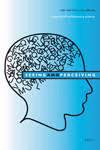Short and sweet, or long and complex? Perceiving temporal synchrony in audiovisual events
引用次数: 2
Abstract
Perceived synchrony varies depending on the audiovisual event. Typically, asynchrony is tolerated at greater lead- and lag-times for speech and music than for action events. The tolerance for asynchrony in speech has been attributed to the unity assumption, which proposes a bonding of auditory and visual speech cues through associations in several dimensions. However, the variations in synchrony perception for different audiovisual events may simply be related to their complexity; where speech and music fluctuate naturally, actions involve isolated events and anticipated moments of impact. The current study measured perception of synchrony for long (13 s) and short (1 s) variants of three types of stimuli: (1) action, represented by a game of chess, (2) music, played by a drummer and (3) speech, presented by an anchorwoman in a newscast. The long variants allowed events to play out with their natural dynamics, whereas short variants offered controlled and predictable single actions or events, selected from the longer segments. Results show that among the long stimuli, lead asynchrony was detected sooner for speech than for chess. This contrasts both with previous research and our own predictions, although it may be related to characteristics of the selected chess scene. Interestingly, tolerance to asynchrony was generally greater for short, than for long, stimuli, especially for speech. These findings suggest that the dynamics of complex events cannot account for previously observed differences in synchrony perception between speech and action events.简短而甜蜜,还是冗长而复杂?在视听事件中感知时间同步
感知到的同步性因视听事件而异。通常情况下,语音和音乐的前置和滞后时间比动作事件更能容忍异步。对言语异步的容忍归因于统一假设,该假设提出了听觉和视觉言语线索通过几个维度的联系联系起来。然而,对不同视听事件的同步感知的变化可能仅仅与它们的复杂性有关;在语言和音乐自然波动的地方,行动涉及孤立的事件和预期的影响时刻。目前的研究测量了三种类型刺激的长(13秒)和短(1秒)变量的同步性感知:(1)动作,以下棋为代表;(2)音乐,由鼓手演奏;(3)演讲,由女主播在新闻节目中呈现。长变量允许事件以其自然动态进行,而短变量提供可控制和可预测的单个动作或事件,从较长的片段中选择。结果表明,在长时间刺激中,言语刺激比象棋刺激更容易被检测到。这与之前的研究和我们自己的预测形成对比,尽管这可能与选定的国际象棋场景的特征有关。有趣的是,对短刺激的耐受性通常比长刺激更强,尤其是言语刺激。这些发现表明,复杂事件的动态不能解释先前观察到的言语和动作事件之间同步感知的差异。
本文章由计算机程序翻译,如有差异,请以英文原文为准。
求助全文
约1分钟内获得全文
求助全文

 求助内容:
求助内容: 应助结果提醒方式:
应助结果提醒方式:


